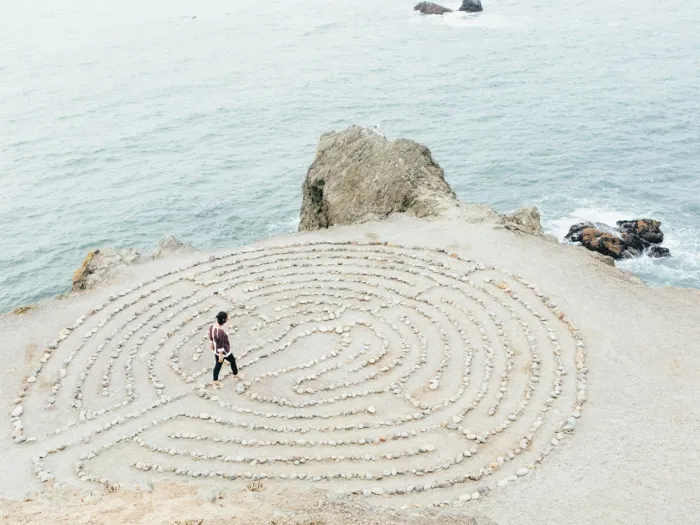Understanding the radicalization of American boyhood
The Rev. Angela Denker is a recent guest on ‘A Matter of Faith: A Presby Podcast’

LOUSIVILLE — The Rev. Angela Denker, author of the new book “Disciples of White Jesus: The Radicalization of American Boyhood,” told the hosts of “A Matter of Faith: A Presby Podcast” that our view of who God is — especially if it’s as an authoritarian God — can shape our worldview, particularly for white men and boys.

The ”white Jesus” in the title “is a great overarching symbol for understanding how many of us in white American Christianity have lost the plot when it comes to who Jesus is,” Denker told the Rev. Lee Catoe and Simon Doong during an hour-long episode of “A Matter of Faith” that can be heard here. Over the past 10 or 15 years, some have made Jesus into “a warrior, emphasizing bringing men back to the church,” she noted.
“The words we can’t ignore” when discussing this topic are “money” and “media,” said Denker, an Evangelical Lutheran Church in America pastor in Minnesota. “There’s a lot of money to be made” via social media “by radicalizing young men. It’s a very grifty place, whether you’re selling supplements or personal training or Bible studies. Media goes hand-in-hand with money. There’s a strong, organized, developed sense of right-wing Christian media that is met with a vacuum when it comes to messaging about masculinity from the other side.”
Asked by Catoe to talk about such trends as circulating distorted images of Jesus’ body “to push toxic masculinity,” Denker noted that body modification “to conform to the feminine ideal within right-wing Christianity is really at a fevered pace.” Among Mormon women and others, “there is a high rate of plastic surgery, injectables and hair extensions. All of this is part of the same conversation when we’re looking at Jesus’ body.”
“Christianity has been weaponized to support a gender hierarchy and is moving away from the central parts of Jesus’ mission,” which was “ministry to the poor, justice for the oppressed” and the creation of an environment “that was free and safe for everyone, a place where everyone can access God,” she said.
People have been sending Denker modified images of President Trump’s body manipulated alongside that of Jesus. “Both of them look quite muscular — big pecs, big biceps, big abs — and neither one has any relation to reality,” Denker said. “It’s very bizarre, but it’s part of the way our reality is being modified by screens … We’re not seeing our bodies how God created us, and therefore, we’re not having respect for bodies — for bodies of migrants, people who are experiencing homelessness and people living with chronic disease. I think all of it is contributing to a lack of compassion and a really cruel world.”
Denker started her career as a sportswriter, “spending time around young men considered to have that ideal body as professional athletes,” she said. “It’s a very different sense when somebody is presenting themselves publicly to look very different than their body actually is. It reveals this level of self-rejection and insecurity.”
She said she hopes readers of her book will include “parents and grandparents, caregivers and educators — those who are not looking to condemn someone, but looking at how this is manifesting in our own communities and family relationships.”
A close friend of Denker was a wrestler during their high school years. “He was one of the first to talk to me about what eating disorders look like from a young man’s perspective,” she said. “In the church and in education, we’re a little behind in addressing those views from a male perspective.” We are “far behind addressing men and young boys as full humans with the same wide spectrum of needs, bodies and insecurities. I think that’s an important starting point in understanding who Jesus was and who we are.”

Doong wondered: “How do we counteract this trend?”
We should start by understanding our terms, Denker said, starting with what it means to be a Christian.
“If you say you are Christian, people are generally going to think that means you’re politically conservative, and unfortunately there’s a large erasure of the Black church and of Christians of color,” Denker said. “It’s become a term that has nothing to do with the historic witness of the church when it comes to the social gospel, abolitionism — any of those historic movements.”
“I do think there’s a role for individuals in high-profile positions,” she said. One example is Episcopal Bishop Mariann Edgar Budde asking President Trump to “have mercy upon the people in our country who are scared now.”
“The role of witness in key spots, where you know that you have a public space as a minister or as a leader, is important,” Denker said. But “I also think change begins at the grassroots level.” People who belong to a small faith community and believe they thus have little influence can work within their own communities, she said. “Look within the boys and young men in your own orbit. When you start those conversations, I find everyone has a story — a story of a nephew, a son, a neighbor, a friend’s son — who’s feeling like someone they know is in trouble. [Young boys] are watching those videos on YouTube and starting to have ideas grounded in racist ideology.”
“The hope here is for change through relationship, and also through alternative narratives — different visions of who Jesus is, what Jesus’ role was as a human man, and what his narrative offers as an alternative vision,” she said.
One caution, she said, is that “in progressive spaces, we say, ‘Why are we talking about white boys and men? They’ve had their day. They continue to suck up all the oxygen out of the room. They have all the power, the positions, the wealth.’”
“I think not talking about it is never the answer,” Denker said. “It doesn’t address the needs of white men and boys in our communities. Jesus calls us to see the image of God and the breadth of humanity in every person, and that’s the challenge right now for the church: to maintain that vision and to be able to cast a vision of what white male Christian masculinity might look like.”

Boys are told not to cry, Doong noted. “It’s such a toxic attitude to have. Jesus wept. Jesus showed us it’s OK to cry.”
“So many men and boys are naturally empathetic,” Denker said. “When you’re told you’re in conflict with who God wants you to be, that creates a really dangerous environment … We have gender tendencies, but I think in the church we really over-emphasize the gender tendencies and differences, and under-emphasize the differences in individual people and how we can co-exist because of who we are individually.”
What she’s seen “over and over again” is “this identity crisis for boys and men as a precursor to radicalization. It’s this loner identity, this lack of community, a lack of fitting in, that’s really fertile ground for some of these grifters and white supremacist teachers to find places to plant their seeds.”
Failure and shame “can push people to do mean things to others and to themselves,” Doong said. “The church can be a place that encourages people to be themselves — to be vulnerable and to be angry.”
We’ve got to get back to holding and encouraging person-to-person conversations, Denker said.
“I recently did an event here in Minnesota with a secularist group. I didn’t think they’d be interested in my presence, but we have found common ground on maintaining the separation of church and state when it comes to confronting Christian nationalism,” she said. “We have to be willing to look for allies and not get caught in our siloes, as we too often do, and not be overly concerned about purifying one another’s positions.”
Go here to listen to previous editions of “A Matter of Faith: A Presby Podcast.”
You may freely reuse and distribute this article in its entirety for non-commercial purposes in any medium. Please include author attribution, photography credits, and a link to the original article. This work is licensed under a Creative Commons Attribution-NonCommercial-NoDeratives 4.0 International License.




